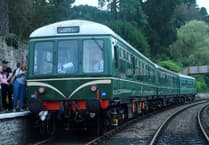Arthur Milton, the last person to play cricket and football for England, called into the George pub, St Briavels, in the summer of 1974. At that time, at the end of a long and distinguished career as a Gloucestershire and England cricketer, he was playing in the early limited overs league matches, and was raising funds for his well earned benefit after 26 years dedication as batsman for county and country. Gloucestershire were playing at Lydney in those early days of the County Sunday league, and Arthur called into the George to publicise his benefit match, and I believe that this unique sportsman was generously rewarded for his pre-match visit to the pub, although I don’t think that he had an alcoholic drink.
He was a Bristol boy, a unique sporting character because he had also played football for Arsenal and England, and was the last sportsman to play football and cricket for England, an achievement that will never again be equalled.
In spite of dedicated work to maintain the Lydney ground as a first class cricket venue, as prepared by master groundsman Bob Park, it did not survive long as a county cricket ground. Bob’s great work is commemorated in the naming of Lydney Cricket Club arena as ‘The Bob Park Cricket Ground. Shortly after Arthur Milton’s appearance at the ground, the county decided to restrict its matches to Bristol and Cheltenham. Other outlying county grounds, at Swindon, Stroud, Moreton-in-March, Trowbridge, and Gloucester, were also deprived of county cricket status. Swindon, in Wiltshire, complained that their local Gloucestershire cricket supporters were being deprived of an opportunity to support their county favourites. The county club’s response, that Swindon is not in Gloucestershire, was rapidly demolished by the observation that Bristol is also not in Gloucestershire, being a city outside county jurisdiction. This accurate observation cut no ice with the county, as the county pulled in its horns and restricted its first class and limited overs matches to Cheltenham and Bristol, depriving supporters of Gloucestershire Cricket club in the Forest, Gloucester and most of the Cotswolds of the opportunity to watch their team in their area.
The traditional cricket first class game was and is a two innings affair over 3, 4 or 5 days, with the opportunity for a struggling team to avoid being dismissed in both of its innings, and then to claim a dishonourable draw however many runs more their opponents had scored. This apparent anomaly was rectified in the new form of the game, a limited overs single day/single innings format, when matches are played with one innings only, 60 overs each, subsequently cut to 50 overs, and now with versions including 20 overs, and recently 100 balls, which represents16.4 overs. This seems to have revived the popularity of the game. You can’t play for a draw, or bat out a maiden over in limited overs matches. There’s instant gratification – lots of wickets and boundaries, and no long boring periods of attrition where bowlers are trying to avoid conceding runs and not taking wickets, while batters are batting not to score runs but to avoid losing their wicket. At first, this revolutionary form of the game was viewed by purists like me with great suspicion. But now we can see the influence of this new form of the game on traditional county and international 5 day matches. ‘Bazball’, the aggressive approach to batting, adopted by and named after the new England coach Brendan McCallum, shows the longer format of the game can be as exhilarating as the one day formats. The recent test match between England and West Indies featured batting by England as exciting and positive as displayed in any limited overs matches. It’s a pity that we now have to go to Cheltenham or Bristol to see our county team playing in any version of the game. I don’t think that Arthur Milton would recognise the diverse versions of cricket played today.





Comments
This article has no comments yet. Be the first to leave a comment.